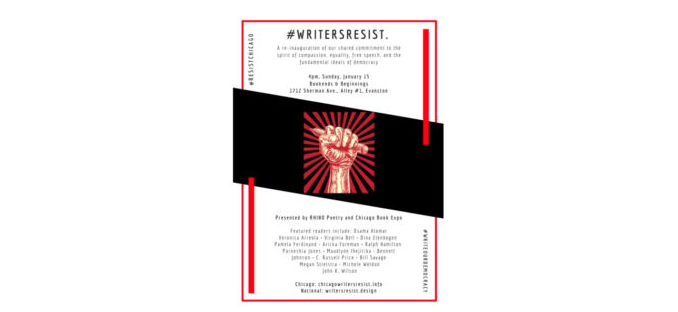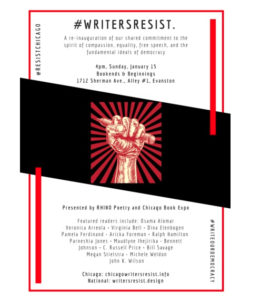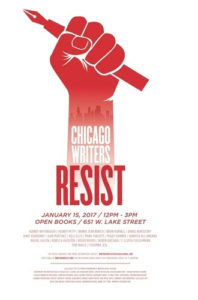
Late last month, I received an e-mail about Chicago Writers Resist, an event intended to serve as a “re-inauguration of our shared commitment to the spirit of compassion, equality, free speech, and the fundamental ideals of democracy,” that would be coming up in the new year. Interested in the event, and feeling that such an event is needed perhaps now more than ever, I was eager to learn more. Last week, I finally had the opportunity to speak with Lynn Haller and John K. Wilson, who have organized the event scheduled to take place in Evanston along with Ralph Hamilton of RHINO Poetry. Read on to see what Lynn and John had to say…

Andrew DeCanniere (AD): For those who may not already be aware, what is Writers Resist?
Lynn Haller (LH): The idea for the event originated with poet Erin Belieu and caught on from there. I think that the first event was held in New York and it spread through a number of contacts, and now there’s an organizing forum and events are happening worldwide. It’s really aimed to be a non-partisan event that focuses on the things we can all agree on — things like freedom of speech, democracy, democratic principles. It’s been very interesting to be a part of the Facebook group for the organizers, because we get to see all of the different formats of the events that are being held. Some are, say, at the local library, where they may have people reading from Martin Luther King’s speeches and then have a variety of writers who have written about these principles. Most of the events happening in the Chicago area are more focused on having writers read their own work addressing these same things. There are a variety of different interpretations in different areas — and there are some that have a kind of combination of local writers and then a sort of open mic component with community members as well.
AD: That sounds great and it’s wonderful that these kinds of important issues are being addressed in communities around the country and, really, in countries around the world. One of the things I’m curious about is that you mention this is intended to be non-partisan, and yet since Donald Trump was declared the winner of the election back on November 9th, there seems to be this group of people in this country eager to embrace him and it would seem that, for them, quite often, it’s more about falling in line, presenting this united front and going along with the President-elect’s program.
LH: One of the reasons that this is meant to be non-partisan is because, for one, we would like to gather the energy that people on all sides feel about some of the issues that have come up. Also, non-profits are not really supposed to campaign for anybody either way. So, it is important to have the energy of all of these different organizations, like PEN America. I mean, free speech is important, but it is also one of the reasons it’s important the event is not framed as a partisan event.
AD: Right. I certainly agree — I mean, certain issues, like free speech, are presumably not only important to one side or to the other, but to both. Or you would hope that they are.
LH: That’s why, for our events, one of the things we agreed on is that we don’t want to restrict what people are allowed to say, individually. Everyone is responsible for what they say, basically. That’s how we’re approaching it, because we are non-profits, too, but also because we do not want to restrict what people are allowed to say. That’s kind of how we’re interpreting it, and I think that each group will have their own way of interpreting that, because we have a lot of different organizers. There are seven events around the area, and I think that everybody will have their interpretation of how they want this to go. For us, we specifically thought about people who had strong Evanston ties and an interesting Evanston story — like, for instance, Bennett Johnson. We considered him a critical person we wanted to have at our event. So, I think each neighborhood is interpreting it in their own way.
AD: And I’d think that it makes it even more relevant for people to have it tailored to their own communities and to their own concerns, to have the issues that they view as the most pressing or most relevant discussed and addressed.
LH: Absolutely.
AD: And while the event may not be all about the President-elect, I do think that he is perceived by many to be one of the main threats to our democracy, which I think is understandable. When you hear him speak or read what he has said — or, for that matter, what he has tweeted in the middle of the night — there does seem to be this extreme disregard for the parts of our system that do not benefit him and a playing up of those parts of the system that do benefit him in some way. His stance on the Electoral College, for instance, is one place where you see this drastic shift of opinion. At first it seems as though he felt the Electoral College is doing the country a disservice, but since he won the Electoral votes he needed, the Electoral College is a wonderful idea. He has also actively and intentionally spread misinformation — fake news — while dismissing legitimate news reports that cast him in a negative light, even though the reports are truthful.
LH: I mean, you have these arguments on Facebook. I just saw this recently where somebody said ‘Well, I’m glad that they’re repealing Obamacare,’ but then said that they have an ACA [Affordable Care Act] plan, so they’re going to be OK. Well, ACA is Obamacare, you know? So, they’re preying on people who do not exactly understand what they’re voting for. That’s one of the reasons that we have people who will be speaking about things like ‘How do you know what’s true?’ That’s a good thing to think about. How do you know what you think is true is, in fact, true? We all want to know that what we think is a fact is, indeed, a fact. That’s something you would hope everybody could agree on. So, focusing on things like that makes it a bit more constructive, because you have to figure out where we go from here.
Another thing we’re trying to do is to figure out some of the needs in the community — especially in the literacy areas — where people can direct their energy, because there is a lot of energy and that interest needs to go somewhere. Since we’re working in this particular area, there’s so much going on that people could do. We’re trying not to say ‘this is a political action thing that you can do,’ because those people are already energized — but for people who would like to help out in their local communities, there are things like Reading Buddies at the YWCA. You can make a difference on an individual level on all of these matters, no matter where you are on the political spectrum. That’s something we can all agree on. It would be great if more children are encouraged to read. Hopefully we can all agree on that.
AD: I know that I certainly do. I’ve been an avid reader from a very young age, so I think that it’s wonderful that there is this focus on things that you can do to have a positive impact on your own community.

John Wilson (JW): I just think it’s a great way to bring together a lot of people to talk about these issues and what this country is going to be facing over the next four years. A lot of what went on in the campaign didn’t address a lot of the issues that are important to people, and so I think this is a way to have a discussion about those topics and to let people speak with a variety of different voices about what they see as the problems facing this country.
AD: I definitely agree. I certainly think that, in any election, it is important for the candidates to focus on themselves and on each other to a certain extent, but at the end of the day it is supposed to be about the people. So, it’s wonderful to have these other forums and other opportunities in which we can discuss the pressing issues of our time with fellow community members and really think about what we need to do and, for that matter, how we may be able to positively contribute to our communities and the political process — especially when it comes to the truly important issues, like freedom of speech or freedom of the press, for instance. It kind of seems as though some feel as if freedom of speech or, for that matter, freedom of the press does not — or should not — apply to those who would disagree with the President-elect.
JW: I think even people who voted for Donald Trump share a lot of suspicion in who he is and what he might do. Frankly, I feel that the only reason he won is that people are suspicious of government and they feel it isn’t working on their behalf. I think there’s a certain validity in that. I think the idea here is to let artists speak their minds and to allow them to convey how they feel about the issues and the values they want to express. I think we’re going to hear a lot of interesting things at all of these events on Sunday.
AD: Well, I know that one of the things that appeals to me the most is the issue of fake news. I’m so glad that’s being addressed. I think that’s great, because it seems as though that has become a real problem over the course of this election. Thankfully, it does seem like Facebook has stepped in somewhat and come up with a feature intended to alert individuals to those stories that may be fake news. However, there’s still a need to talk about the issue and really inform people as to how they can spot this misinformation for themselves, so that everyone has the tools to tell a legitimate story from something simply masquerading as legitimate while having absolutely no basis in fact whatsoever.
JW: Yeah. I think there’s a lot of that. In many ways, he is the candidate of fake news. He’s the candidate of conspiracy theories. I think part of this event is about people trying to express a commitment, fundamentally, to the truth — to speaking the truth about their government, about the reality of racism, sexism and oppression that’s going on in the world. Sometimes, speaking the truth might offend or annoy some people who disagree with it, but it is fundamentally what the First Amendment is all about and what these values of free speech are all about and what democracy is — allowing people to speak this truth and to confront those they think are not representing their values and who are not speaking the truth.
For additional information regarding Chicago Writers Resist, please log onto www.chicagowritersresist.info. If you are outside of the Chicago area, and would like to learn more about events that may be taking place in or around your community, log onto www.writersresist.org for more information.
Events in the Chicagoland area are as follows…
January 15, 2017 beginning with the noon Loop event:
Noon-3:00PM: LOOP at Open Books in the West Loop, 651 W. Lake St.
1:00-3:00PM: RIVER WEST at Woman Made Gallery, 685 N. Milwaukee Ave. “Inauguration: Affirmation, Empowerment & Resistance;”
2:00-4:00PM: PILSEN, at Flor del Monte, 1951 West 22nd Place;
2:30-4:30PM: ALBANY PARK/ OLD IRVING PARK, at Café Urbano, 4176 N. Elston Avenue;
4:00-6:00PM: EVANSTON, at Bookends and Beginnings, 1712 Sherman Avenue, Alley #1;
6:00PM: LOGAN SQUARE, at Cole’s, 2338 N Milwaukee Ave, 21+, SPEAK UP/WARM UP to Benefit the Logan Square Neighborhood Association;
7:00PM: HUMBOLDT PARK, at La Bruquena, 2726 W. Division

Be the first to comment